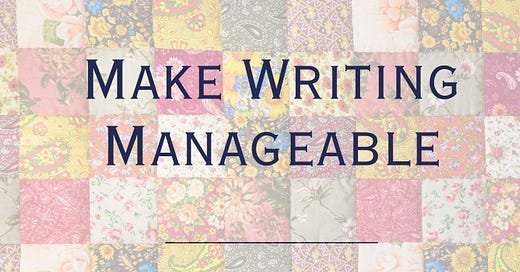Dear all
When I used to write frequent articles for magazines, I had a strict word count and so the first thing I would do is to break it down into manageable chunks with a word count target. I’d begin with a template like this for a 1200 word article:
[TITLE]
[STANDFIRST - couple of lines summary to draw the reader in]
[INTRO & HOOK - 150 words]
[PARA 1 - main idea, a bit of background - 300 words]
[PARA 2 - idea development, case study example - 300 words]
[PARA 3 - deepening, counter argument - 300 words]
[CONCLUSION - 150 words]
[FIND OUT MORE - any extra links, useful tips etc]
I would write the notes for my main points in a different colour and then gradually replace with full sentences for my first draft. Then, I’d rewrite to make it all flow better.
So I’ve been thinking about how to break down a book or larger writing project to make it manageable and easy to fit into a busy life.
I’ve been thinking about writing units. And one of those units in short stories, novels, creative non-fiction or memoir is a scene. These can be written before you have an outline or any inkling of what the whole book might be about. You can gather and rearrange or evolve a story in this way.
How to write a scene
A scene is a building block of a bigger story (used in short stories, novels, creative non-fiction and memoir) and moves the story on somehow. In a scene, I like to be taken into the story, so that I can feel as if I am there, not in the character's head necessarily, but in the action and world. At times, in a key scene, you may want to slow down the action for heightened emotion. And at other times, a scene might be brief but drive the reader from one place to another.
I like to think of a scene as a moment, but it can be more than that. It is usually one action or takes place in one setting and in one period of time. It's probably best to use one point of view. It also has its own story arc which contributes to the overall story arc.
There has to be some sort of change or shift in the scene, but here are some elements to include as well:
Mood & Atmosphere: Locate the reader - can include time, place, weather, mood, colour, description. Make it concrete and visual. Evoke an emotion with your writing.
Characters: If you begin with one character, then try introducing another. If there are two characters, try to have a third interloper. Make the characters interact with each other. How does one character’s actions or words affect the other and vice versa?
Dialogue: Include some dialogue (doesn't have to be in every scene, but most, I would say). For extra nuance, the subtext will be different to the actual words and contribute to the story. It should also add to character development somehow.
Action: This can be subtle, but something needs to happen. And there also needs to be tension. This can be internal or external. Though at times, the character needs to slow down and be more reflective to give the reader a bit of breathing space.
Purpose: Each scene needs to have a purpose and show something about the character or move the larger story on in some way.
Bonuses: flashbacks, memories, secrets hidden or revealed, objects, strong exit line which leaves the reader wanting more.
Have I left anything out? Do you have any questions about writing scenes?
For more about the book writing process, look out for my first My (Gentle) Book Writing Adventure post, which will land in your inbox next Wednesday 2 October for the new moon!
Creative Writing Workshops with me (Mel Parks)
Tuesday afternoons on Zoom (2-3pm UK time)
£8 per month or £80 per year with a paid Awen Substack subscription.
You can come to as many as you are able to. The new season began on Tuesday 10 September 2-3pm (UK time) but you can join in at anytime.
If you are not able to subscribe (or don’t want to!), then please email me for alternative ways to join.
Becoming a Writer
Monthly Tuesday evenings in East Grinstead (7-9pm)
A monthly creative writing workshop for beginners. Plenty of fun writing prompts, games and activities to get your creative juices flowing.
Each session costs £30.
The Writer’s Notebook
Weekly Thursday mornings in East Grinstead (10-12noon).
Series of five weeks from 7 November to 5 December. £135 for all five weeks.
Storying Ourselves in Nature | A Creative Writing Day at Emerson College, Forest Row, Sussex.
Saturday 9 November
Until next time…







